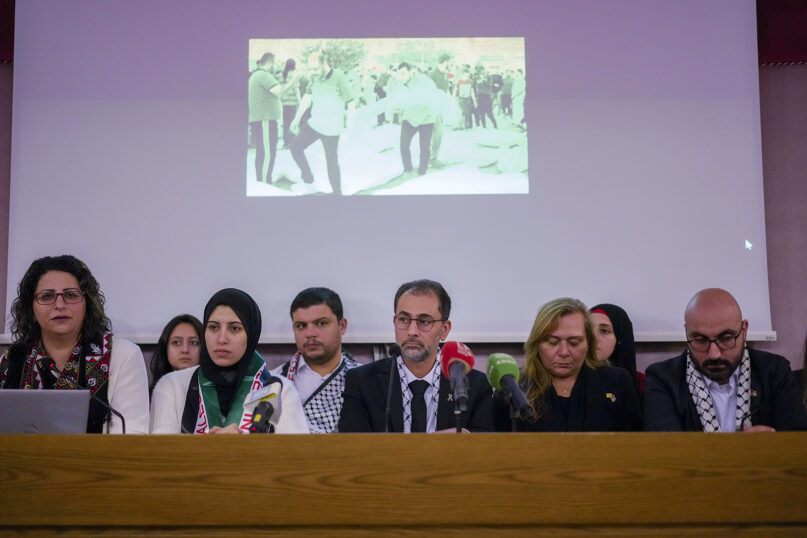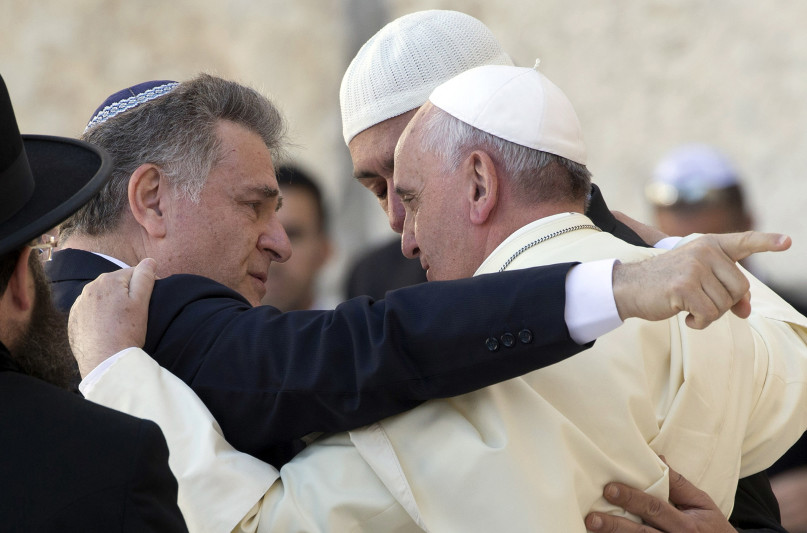VATICAN CITY (RNS) — While many at the Vatican let out a sigh of relief following reports that Hamas and Israel agreed to a ceasefire on Friday (Jan. 17), the interruption of hostilities in Gaza might not be enough to repair Catholic-Jewish relations, damaged by Pope Francis’ criticism of Israel.
“There is a crisis in Catholic-Jewish relations because of a series of papal comments,” said Rabbi Noam Marans, director of the interreligious affairs department at the American Jewish Committee (AJC), in an interview with RNS.
While Francis’ gestures and remarks may have hindered the carefully restored relationship between Catholics and Jews, some Jewish representatives said that it’s not enough to undo decades of joint efforts to promote dialogue and understanding between the two great monotheistic faiths.
Conflict between the state of Israel and Pope Francis started soon after the attack by Hamas terrorists on Israeli citizens on Oct. 7, 2023. About a month after the event, Francis told faithful gathered at St. Peter’s Square that in Gaza “we have gone beyond wars. This is not war. This is terrorism.” For many Jews, the pope’s comments hinted at a moral equivalency between Israel and Hamas.
“I believe that his sensitivity to the real suffering of the Palestinian people has led him to sometimes express himself almost too casually,” said Argentine Rabbi Abraham Skorka, senior research fellow at Georgetown University and an old friend of Pope Francis’ since he was archbishop in Buenos Aires.
More incidents followed over the course of the 15-monthlong conflict that has already claimed the lives of over 46,000 Palestinians and 1,600 Israelis (1,200 on Oct. 7 and 405 soldiers killed afterward), according to U.N. estimates. Last November, a preview of an book of interviews with the pope reported Francis calling for an investigation into whether the term genocide was appropriate to describe the Israeli offensive in Gaza. The Vatican dismissed the media reports, stating that the pope’s words were taken out of context.

A delegation of Palestinians attend a press conference at the Vatican after meeting with Pope Francis, Wednesday, Nov. 22, 2023. Pope Francis has met with family members of Palestinians living in Gaza and with family members of the over 220 Israelis abducted by Hamas militants on Oct. 7. (AP Photo/Andrew Medichini)
Around the same time, Palestinian representatives who met for a private audience with the pope at the Vatican said that Francis referred to the Israeli actions in Gaza as genocide. As they recounted their meeting to journalists, the Vatican issued a statement denying that the pope used those words. It was the words of the Palestinian delegation against the pope’s, and the case was dismissed as yet another Vatican communications disaster.
Then a picture went viral around the world showing Francis looking at a Nativity scene where Jesus was placed on a keffiyeh, the black-and-white checkered scarf that has become a symbol of the Palestinian cause. Palestinian representatives who attended the presentation of the Nativity scene had placed the scarf last minute according to the artist. Again, the Vatican intervened by removing the keffiyeh with the excuse that the infant Jesus is traditionally not placed in the manger until Christmas Day. But when the day came, Jesus was returned without the keffiyeh.
The Vatican’s clumsy attempt to repair the damage already done wasn’t enough for Israel’s minister for Diaspora Affairs and Combating Antisemitism, Amichai Chikli, who criticized the pope for his endorsement of “portraying Jesus as a Palestinian Arab.” In his Dec. 20 remarks, he also said that by using terms such as genocide when referring to Israel’s actions in Gaza, Francis “echoed the new blood libel” and it constituted “a trivialization that is dangerously close to Holocaust denial.”
The Vatican’s diplomatic tactic to mediate a peace between Israel and Palestine by remaining above the fray proved unsuccessful.

Pope Francis prays in front of a Nativity scene crafted in the West Bank city of Bethlehem, as he arrives for a meeting with the donors of the fir tree set up in St. Peter’s Square as a Christmas tree and those who have crafted the life-size Nativity scene at the tree’s feet, in the Paul VI Hall at the Vatican, Saturday, Dec. 7, 2024. (AP Photo/Andrew Medichini)
“In discussions with various members of the Vatican, I learned that they face pressure from both the Jewish community and those who support the Palestinian cause. Each group looks for gestures from the pope and rarely feels satisfied,” Skorka explained.
Most recently, the pope referred to Israeli raids on Gaza that led to the death of civilians, including children, as “cruelty, not war,” while speaking to cardinals at the Vatican. The remarks led Israeli Foreign Minister Gideon Sa’ar to question the Vatican representative in Israel about the pope’s remarks. Many Jewish organizations worldwide responded to the pope’s comments with dismay and anger.
The Conference of Presidents of Major American Jewish Organizations wrote in a statement that Francis’ comments to the cardinals at the Vatican were “incendiary.” The supreme rabbinic authority in Israel also stepped in to chastise the pope’s words. “Your words and actions regarding the State of Israel are not merely disappointing, they represent a historic danger,” wrote Rabbi Eliezer Simcha Weisz, a member of the Chief Rabbinate Council of Israel, in a statement Jan. 9.
Weisz also pointed to Francis’ vicinity to Iranian representatives as lending “papal authority to modern antisemitism.” Iran has financially supported Hamas and other armed jihadist groups for decades, according to the European Council on Foreign Relations.
In November the pope created the first cardinal to Tehran, Bishop Dominique Methieu, strengthening the diplomatic ties between the Vatican and Iran, which date back to 1954. After a meeting with the pope at the Vatican on Jan. 3, the chancellor of the Iranian University of Religions and Denominations, Navab Seyed Abolhassan, told Iranian media outlets that Francis expressed his disapproval of Israeli Prime Minister Benjamin Netanyahu.
In many of the cases of Vatican gaffes with regard to Jewish relations, the Catholic institution has accused the media of misrepresenting the pope’s words. “Throughout his papacy, (Pope Francis) has often mentioned to me that his words and gestures are frequently distorted by the press,” Skorka observed.
“In addition, in a time of war there are many self-serving partisans who seek to portray the pope as endorsing their often-contradictory positions or actions,” he added.
While tensions are high between the pope and many in the Jewish community, several Jewish leaders cautioned against portraying it as an irreparable rupture. In 1965, the Second Vatican Ecumenical Council published the historic document “Nostra Aetate” (Our Age), which condemned antisemitism as abhorrent and reaffirmed the Jewish roots of Catholicism.
This change in perspective has made it so that, “in many ways, this 60-year arc has been the golden age of Catholic Jewish relations,” Marans said, pointing to projects such as the joint initiative by AJC and the U.S. Catholic bishops’ “Translate Hate” to combat antisemitism in the U.S. where the largest number of Catholics and Jews live side by side. In recent decades, popes have never forgotten to pay homage to the Synagogue in Rome, to visit Jerusalem and pray at concentration camps. Francis has maintained this tradition.
As archbishop in Buenos Aires, Francis collaborated with Skorka in elevating Catholic-Jewish relations, and together they published a book of dialogues, “On Heaven and Earth” (“Sobre el Cielo y la Tierra,” 2010) and recorded 31 television dialogue programs for the local archdiocesan channel. While they held different perspectives, the two focused on what they had in common instead of what separated them, Skorka said.

Pope Francis embraces two good friends of his traveling with him, Argentine Rabbi Abraham Skorka, left, and Omar Abboud, leader of Argentina’s Muslim community, partially seen behind the pope, as he visits the Western Wall in Jerusalem’s Old City, Israel, Monday, May 26, 2014. Both friends joined the pontiff’s official delegation for the trip in a sign of interfaith friendship. (AP Photo/Andrew Medichini, Pool)
When he became pope, Francis kept his relationships with rabbis and made his 2014 visit to the Holy Land a priority. Many welcomed his opening of the documents concerning Pope Pius XII’s leadership and silences during the Holocaust — Pius never publicly condemned the Nazi genocide against the Jews.
“When the pope speaks out about what is happening in Gaza or in a war in general, he is not talking only as a religious leader but also as a leader of an international organization and of a state that is a member of the international community,” said Massimo Faggioli, a professor of theology and religious studies at Villanova University, in an interview with RNS on Friday (Jan. 17).
“Pope Francis is not criticizing Israel as a whole or the Jewish people as a whole but just pointing to the action of this government,” he added. Faggioli admitted that Francis’ language on the situation in Gaza was “not careful” and has called into question the future of Jewish-Catholic relations.
“I have always felt that his feelings toward the Jewish people reflect the expression coined by John Paul II: ‘older brothers in faith,’” said Skorka referring to Pope Francis. When it comes to the state of Isreal, Francis has supported a two-state solution and had a strong relationship with the former Israeli President Shimon Peres.
In a letter sent to Skorka dated May 21, 2015, Pope Francis wrote that “(w)e must distinguish between the Jewish people, the State of Israel (which has the right to exist), and the temporary governments that the State has. If one does not accept the first 2, one falls into anti-Semitism; on the other hand, the same Jewish people opt for governments that follow one another and are sometimes in the opposite direction.”
The pope’s recent ambiguity surrounding Israel “is not a turn that we saw coming,” said Rabbi Abraham Cooper, associate dean and director of Global Social Action at the Simon Wiesenthal Center, in a statement Jan. 15.
“Perhaps in the remaining time he sits on that throne, Pope Francis will undo some of this serious damage. But for now, Jews will remember him as part of the problem of antisemitism, not its solution,” wrote Rabbi Yitzchok Adlerstein, director of Interfaith Affairs, in the same statement. The Simon Wiesenthal Center is a Jewish global human rights organization that researches the Holocaust and antisemitism.
According to Marans, Catholic-Jewish relations are stronger than the pope’s recent problematic quotes, while Skorka pointed to many places where Jews and Catholics continue to have fruitful dialogue and partnerships.
“The current challenge is to build a renewed and deeper dialogue on the foundations established since 1965. The 60th anniversary of ‘Nostra Aetate’ this year presents a great opportunity for this,” Skorka said.